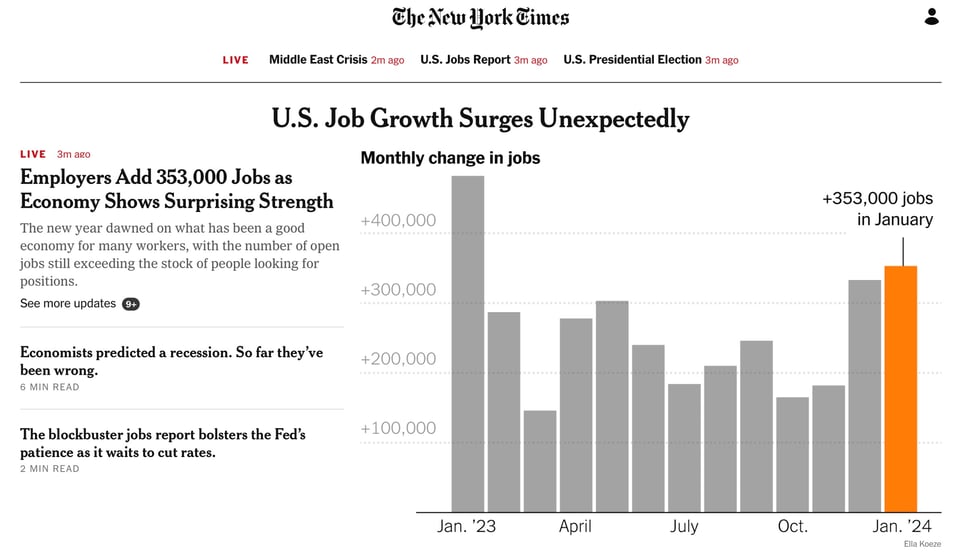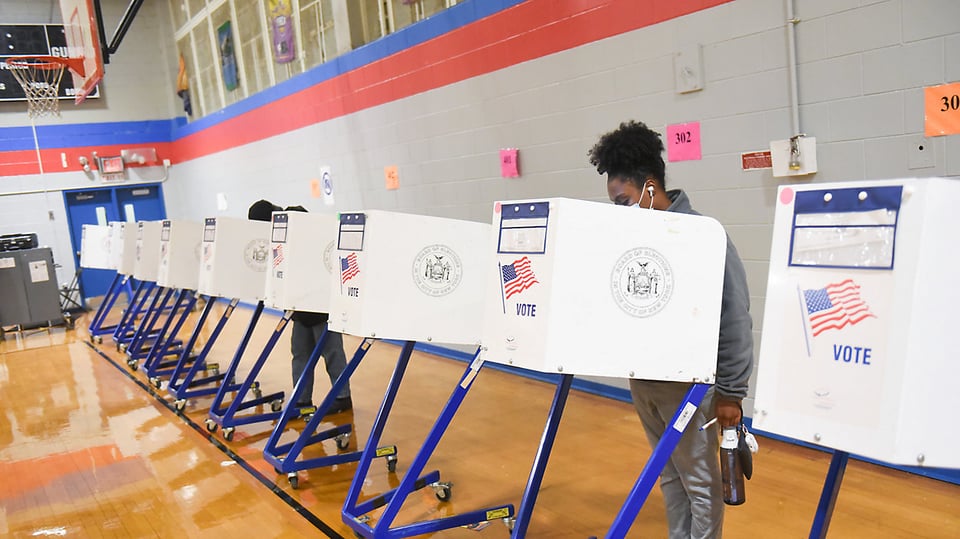Saturday, February 3, 2024. Annette’s News Roundup.
I think the Roundup makes people feel not so alone.
To read an article excerpted in this Roundup, click on its blue title. Each “blue” article is hyperlinked so you can read the whole article.
Please feel free to share.
Invite at least one other person to subscribe today! https://buttondown.email/AnnettesNewsRoundup
___________________________
“Visiting” Columnists to the Roundup.
They don’t know it but Heather Cox Richardson and Joyce Vance are stopping by.
First up… the historian Heather Cox Richardson.
An Overview of where the economy is, who the President is, and who the Republicans are.

One of the biggest stories of 2023 is that the U.S. economy grew faster than any other economy in the Group of 7 nations, made up of democratic countries with the world’s largest advanced economies. By a lot.
The International Monetary Fund yesterday reported that the U.S. gross domestic product—the way countries estimate their productivity—grew by 2.5%, significantly higher than the GDP of the next country on the list: Japan, at 1.9%.
IMF economists predict U.S. growth next year of 2.1%, again, higher than all the other G7 countries. The Federal Reserve Bank of Atlanta projects growth of 4.2% in the first quarter of 2024.
Every time I write about the booming economy, people accurately point out that these numbers don’t necessarily reflect the experiences of everyone. But they have enormous political implications.
President Joe Biden, Vice President Kamala Harris, Secretary of the Treasury Janet Yellen, and the Democrats embraced the idea that using the government to support ordinary Americans—those on the “demand” side of the economy—would nurture strong economic growth. Republicans have insisted since the 1980s that the way to expand the economy is the opposite: to invest in the “supply side,” investors who use their capital to build businesses.
In the first two years of the Biden-Harris administration, while the Democrats had control of the House and Senate, they passed a range of laws to boost American manufacturing, rebuild infrastructure, protect consumers, and so on. They did so almost entirely with Democratic votes, as Republicans insisted that such investments would destroy growth, in part through inflation.
Now that the laws are beginning to take effect, their results have proved that demand-side economic policies like those in place between 1933 and 1981, when President Ronald Reagan ushered in supply-side economics, work.
Even inflation, which ran high, appears to have been driven by supply chain issues, as the administration said, and by “greedflation,” in which corporations raised prices far beyond cost increases, padding payouts for their shareholders.
The demonstration that the Democrats’ policies work has put Republicans in an awkward spot. Projects funded by the Infrastructure Investment and Jobs Act, also known as the Bipartisan Infrastructure Law, are so popular that Republicans are claiming credit for new projects or, as Representative Maria Elvira Salazar (R-FL) did on Sunday, claiming they don’t remember how they voted on the infrastructure measure and other popular bills like the CHIPS and Science Act (she voted no). When the infrastructure measure passed in 2021, just 13 House Republicans supported it.
Today, Medicare sent its initial offers to the drug companies that manufacture the first ten drugs for which the government will negotiate prices under the Inflation Reduction Act, another hugely popular measure that passed without Republican votes. The Republicans have called for repealing this act, but their stance against what they have insisted is “socialized medicine” is showing signs of softening. In Politico yesterday, Megan Messerly noted that in three Republican-dominated states—Alabama, Georgia, and Mississippi—House speakers are saying they are now open to the idea of expanding healthcare through Medicaid expansion.
In another sign that some Republicans recognize that the Democrats’ economic policies are popular, the House last night passed bipartisan tax legislation that expanded the Child Tax Credit, which had expired last year after Senate Republicans refused to extend it. Democrats still provided most of the yea votes—188 to 169—and Republicans most of the nays—47 to 23—but, together with a tax cut for businesses in the bill, the measure was a rare bipartisan victory. If it passes the Senate, it is expected to lift at least half a million children out of poverty and help about 5 million more.
But Republicans have a personnel problem as well as a policy problem. Since the 1980s, party leaders have maintained that the federal government needs to be slashed, and their determination to just say no has elevated lawmakers whose skill set features obstruction rather than the negotiation required to pass bills. Their goal is to stay in power to stop legislation from passing.
Yesterday, for example, Senator Chuck Grassley (R-IA), who sits on the Senate Finance Committee and used to chair it, told a reporter not to have too much faith that the child tax credit measure would pass the Senate, where Republicans can kill it with the filibuster. “Passing a tax bill that makes the president look good…means he could be reelected, and then we won’t extend the 2017 tax cuts,” Grassley said.
At the same time, the rise of right-wing media, which rewards extremism, has upended the relationship between lawmakers and voters. In CNN yesterday, Oliver Darcy explained that “the incentive structure in conservative politics has gone awry. The irresponsible and dishonest stars of the right-wing media kingdom are motivated by vastly different goals than those who are actually trying to advance conservative causes, get Republicans elected, and then ultimately govern in office.”
Right-wing influencers want views and shares, which translate to more money and power, Darcy wrote. So they spread “increasingly outlandish, attention-grabbing junk,” and more established outlets tag along out of fear they will lose their audience. But those influencers and media hosts don’t have to govern, and the anger they generate in the base makes it hard for anyone else to, either.
This dynamic has shown up dramatically in the House Republicans’ refusal to consider a proposed border measure on which a bipartisan group of senators had worked for four months because Trump and his extremist base turned against the idea—one that Republicans initially demanded.
Since they took control of the House in 2023, House Republicans have been able to conduct almost no business as the extremists are essentially refusing to govern unless all their demands are met. Rather than lawmaking, they are passing extremist bills to signal to their base, holding hearings to push their talking points, and trying to find excuses to impeach the president and Secretary of Homeland Security Alejandro Mayorkas.
Yesterday the editorial board of the Wall Street Journal, which is firmly on the right, warned House Republicans that “Impeaching Mayorkas Achieves Nothing” other than “political symbolism,” and urged them to work to get a border bill passed. “Grandstanding is easier than governing, and Republicans have to decide whether to accomplish anything other than impeaching Democrats,” it said.
Today in the Washington Post, Jennifer Rubin called the Republicans’ behavior “nihilism and performative politics.”
On CNN this morning, Representative Dan Goldman (D-NY) identified the increasing isolation of the MAGA Republicans from a democratic government. “Here we are both on immigration and now on this tax bill where President Biden and a bipartisan group of Congress are trying to actually solve problems for the American people,” Goldman said, “and Chuck Grassley, Donald Trump, Mike Johnson—they are trying to kill solutions just for political gain." (Letters from an American, February 2, 2024. Heather Cox Richardson).
One more thing.
The economy is so strong that even the Times was cheerful about the economy yesterday morning.

Usually, as we await the Jobs report, the Times prepares us for economic Armageddon.
By the way, this was the economic news yesterday.

Further, “Unemployment held at 3.7%. Wages rose unexpectedly fast in January, too. Average hourly pay climbed a sharp 0.6% from December, the fastest monthly gain in nearly two years, and 4.5% from January 2023, “ the Associated Press reported yesterday morning.
#Bidenomics. Tell the voters. Give Biden-Harris credit.
On the other issue that Heather Cox Richardson wrote about - the GOP unwillingness to take actions for their own political gain. Grassley’a comment that the GOP won’t help pass bills that will make Biden “look good” was no gaffe.
As Charlie Sykes wrote yesterday, “Even as the resident senior citizen around here, I find myself wishing that I could write off Iowa Senator Chuck Grasley’s latest gaucherie as the result of senility. But no such luck.
When Grassley raised doubts about a bipartisan tax cut bill because it would make President Biden “look good,” and make it harder for Donald Trump to regain the White House, the remark hardly qualified as a gaffe in today’s GOP.” (Annette Niemtzow, Annette’s News Roundup).
___________________________
Next “Visiting Columnist” up - MSNBC legal adviser and legal columnist, Joyce Vance.
Here is a section of the Vance column, “Civil Discourse,” on February 1st, reposted to update Roundup readers on two issues I ignored this past week:
“It’s 8:53 p.m. Central Time as I pick up my pen to write tonight. Neither Judge Engoron’s final decision in the New York civil fraud case nor the long-awaited presidential immunity opinion from the Court of Appeals for the District of Columbia has materialized. We are still waiting.
But there was news tonight on another front.
In the Mar-a-Lago case, ABC is reporting that the FBI failed to search two specific areas inside of Trump’s residence when they executed the August 2023 search warrant. One was a locked closet, the other a hidden room—exactly the kind of places that should have piqued agents’ interest the most! You want to search areas a defendant doesn’t want you to take a look at.”
___________________________
There is one more issue you may want to read up on too - Alan Weisselberg, the Trump Organization former Chief Financial Officer.
Trump’s Former Finance Chief in Negotiations to Plead Guilty to Perjury.

Allen H. Weisselberg would admit to lying on the stand during the former president’s civil fraud trial, according to people familiar with the talks.
Allen H. Weisselberg, a longtime lieutenant to Donald J. Trump, is negotiating a deal with Manhattan prosecutors that would require him to plead guilty to perjury, people with knowledge of the matter said.
As part of the potential agreement with the Manhattan district attorney’s office, Mr. Weisselberg would have to admit that he lied on the witness stand in Mr. Trump’s recent civil fraud trial, the people said.
Mr. Weisselberg, the former chief financial officer at Mr. Trump’s family business, also would have to say that he lied under oath during in an interview with the New York attorney general’s office, which brought the civil fraud case.
The situation springs from a web of criminal and civil cases brought by the two agencies and would culminate a lengthy pressure campaign by the district attorney, Alvin L. Bragg, whose prosecutors had sought Mr. Weisselberg’s cooperation as they investigated whether Mr. Trump committed electoral and financial crimes. Even without Mr. Weisselberg’s cooperation, they indicted Mr. Trump last year in the election-related case, which is scheduled for trial in late March.
The deal being negotiated would most likely not require Mr. Weisselberg, 76, to turn on his former boss. Although Mr. Weisselberg was involved in the action at the heart of that case — a hush-money payment meant to bury a potential sex scandal just before the 2016 election — prosecutors are not expected to call him as a witness. And the investigation that most required Mr. Weisselberg’s help, the district attorney’s inquiry into Mr. Trump’s finances, may no longer be a priority for prosecutors.
Although the potential agreement is unlikely to immediately affect Mr. Trump, it could strengthen Mr. Bragg’s hand before the former president’s trial. It could deter other witnesses in Mr. Trump’s circle from lying on the stand. And perjury charges could discredit Mr. Weisselberg, who has disputed details of the prosecution’s evidence in the case involving the 2016 election. (New York Times).
___________________________
On other matters, both near and dear to my heart.
Give Democratic candidate Tom Suozzi $25. Let’s bring the seat Santos stole back to Blue.
More $$ is good too.
Democrat crushing GOP opponent in campaign cash ahead of NY special election.
Disgraced Congressman George Santos (left), Democratic Candidate Tom Suozzi hopes to replace him, as does the Republican Mazi Pilip (not pictured).
The Democrat in this month’s closely watched New York special election for Congress has outraised and outspent his GOP opponent by a more than three-to-one margin in the race to replace expelled former Rep. George Santos (R-N.Y.)., according to new filings late Thursday.
Former Rep. Tom Suozzi (D-N.Y.), raised $4.5 million from Oct. 1 of last year through Jan. 24, according to a filing with the Federal Election Commission.
That’s more than triple the $1.3 million GOP nominee Mazi Pilip raised over the same period, and it’s helped to give Suozzi and Democrats a leg up on the pricey New York airwaves in the run-up to the Feb. 13 special election.
Suozzi also outspent Pilip, $2.4 million to $714,000, through Jan. 24. But as of last Wednesday, Suozzi had more money on hand for the stretch run of the race: $2.2 million, to $629,000 for Pilip, the filings showed.
Suozzi’s dominant financial advantage is part of Democrats’ overall edge in spending ahead of the special election. In all, Democrats have spent or reserved $9.8 million in advertising for the race, according to AdImpact, compared to Republicans’ $6.2 million. And since candidates pay less for television ads than outside groups, Suozzi’s better cash situation means those numbers actually understate Democrats’ TV ad advantage.
As is typical for high-profile special elections, both Suozzi and Pilip received numerous contributions from their would-be House colleagues, including members of leadership. House Speaker Mike Johnson‘s leadership PAC, American Revival PAC, gave Pilip’s campaign $5,000 in December, while House Minority Leader Hakeem Jeffries’ campaign donated to Suozzi.
Santos, who’s facing indictment on charges of fraud and campaign finance violations but has yet to be brought to trial, was expelled in December, opening up his seat. Party leaders in the New York City borough of Queens and Nassau County on Long Island chose Suozzi and Pilip as their candidates, and each has faced a short sprint to the special election.
A Suozzi victory would further narrow Republicans’ already-small House majority and offer a much needed jolt to Democrats worried over President Joe Biden’s poll numbers. A Pilip win, meanwhile, would suggest that the GOP’s focus on immigration and crime is a potent message in New York City’s outer boroughs and close-in suburbs.
Either way, Democrats in Albany are expected to reconfigure downstate congressional districts in a rare mid-decade redistricting before the November general election, seeking to flip two or three of Long Island’s four seats. (Politico).

The special election to replace Expelled Republican Congressman George Santos is scheduled for Feb. 13, but early voting begins today.
—
Last of all, but top of mind.
Today is Primary Day in South Carolina.
#GoVote #SouthCarolina today, February 3rd
Polls are open 7:00 a.m. – 7:00 p.m.
Find your polling place address at scVOTES.gov.
Don’t forget to bring your Photo ID to the polling place.
Those who don’t vote in South Carolina, call those who can!
Vote. Get out the vote.


Hope your weekend is going well.
___________________________